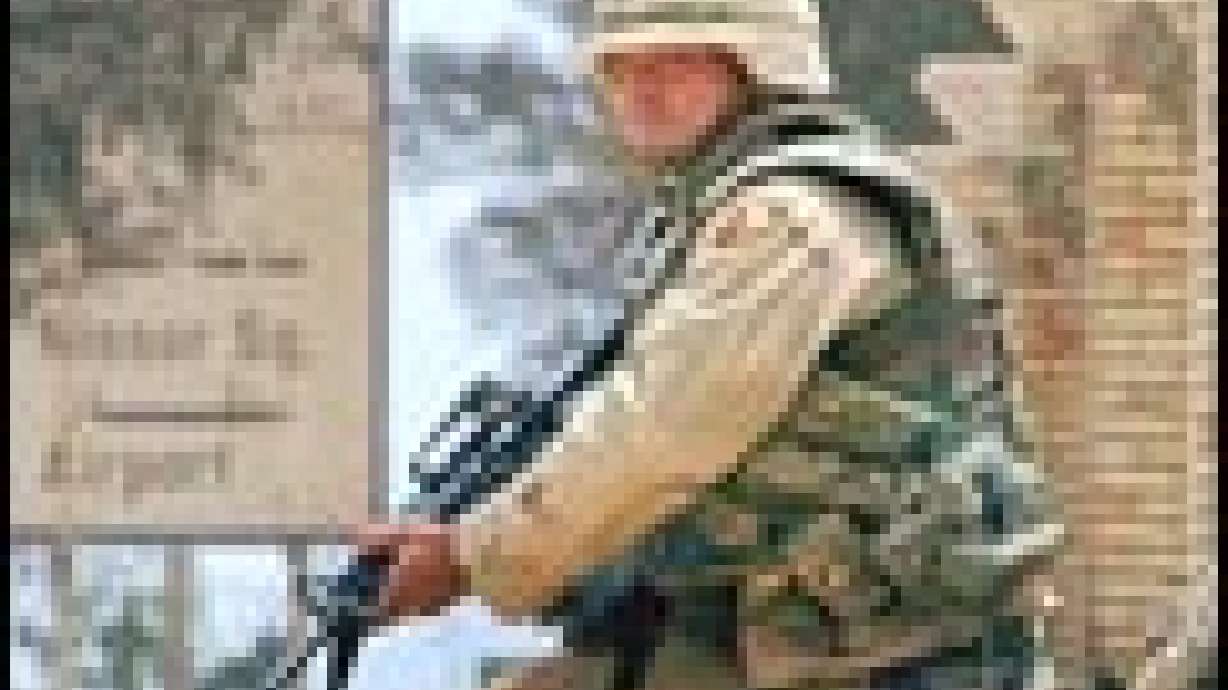Estimated read time: 4-5 minutes
This archived news story is available only for your personal, non-commercial use. Information in the story may be outdated or superseded by additional information. Reading or replaying the story in its archived form does not constitute a republication of the story.
BAGHDAD, Iraq (AP) -- American troops clashed with rioters carrying Saddam Hussein's picture in a Baghdad suburb Friday, and heavy smoke billowed from the mayor's office in a city west of the capital following a big explosion.
In northern Iraq, American troops sealed off the village where Saddam was born and began issuing identity cards to the villagers to determine who can move in and out.
There were conflicting claims about what triggered the clash at Abu Ghraib, a suburb on the western side of the capital. Iraqis said it broke out when U.S. troops tried to clear market stalls from a main road. But a U.S. officer at the scene, 1st Lt. Joseph Harrison, said it began with a grenade attack against American soldiers that left two of them wounded.
Youths began throwing stones at troops and Iraqi police and set tires ablaze. Protesters carried Saddam's picture and shouted "Allahu Akbar," or "God is great."
After a three-hour interlude, gunfire erupted again as helicopters hovered overhead and U.S. armored vehicles moved into the area to control the crowd after hundreds of Iraqis emerged from Friday prayers.
Machine gunfire and 10 explosions were heard, and fleeing civilians said the U.S. troops had "come under attack." A photographer on the scene saw several civilian casualties being evacuated. Within a half hour the gunshots subsided.
Later, mortars fell on an Iraqi police station near the market. The Americans said they arrested two Iraqis carrying a mortar firing tube.
In Fallujah, a center of Sunni Muslim resistance 40 miles west of the capital, a strong explosion rocked the center of the city at midday. Heavy, black smoke could be seen billowing from the mayor's office.
Police said that following the explosion, residents shouted at the authorities that their neighborhood had become a target because the U.S.-appointed mayor and other officials worked there. Civil defense officer Ahmed Khalil said police shot and killed a resident during the ensuing argument.
Later, residents angered by the police action broke into the smoldering building and looted the mayor's office. They eventually dispersed when U.S. Humvees arrived with helicopters patrolling overhead.
An upsurge of attacks this week, coinciding with the start of the Muslim holy month of Ramadan, has killed scores of people, most of them Iraqis in a series of vehicle bombings in Baghdad on Monday. The upsurge prompted the international Red Cross and the United Nations to remove foreign staff temporarily.
But on Friday, the European Union's head office in Brussels, Belgium, said it would not pull its humanitarian aid workers out of Iraq. EU spokesman Diego Ojeda said the current team of about 10 aid workers from the EU's humanitarian aid office would continue its work in Baghdad.
U.S. officials have variously blamed the violence on Saddam loyalists and Islamic extremists. The New York Times reported Friday that three senior American officials believe Saddam is actively planning and coordinating some of the attacks.
Defense, intelligence and national security officials sought Friday to minimize that possibility, however. Discussing the situation only on grounds of anonymity, they said some Iraqis have been asserting for several months that Saddam is involved. But these officials said they are not certain how reliable the information is and said there are no radio intercepts or other types of evidence to corroborate the reports.
American soldiers moved before dawn Friday to seal off Uja, the village where Saddam was born, surrounding it with razor wire and setting up checkpoints at the exits. They ordered all adults to register for identity cards in the village about 95 miles north of the capital.
"This is an effort to protect the majority of the population, the people who want to get on with their lives," said Lt. Col. Steve Russell, a battalion commander in the 4th Infantry Division.
The village is the family home of many former Baathist regime members.
Elsewhere, insurgents mounted attacks on U.S. and Iraqi government targets in the northern city of Mosul, U.S. officers said Friday. There were no injuries in the overnight shelling of a U.S. base near Mosul, the explosion of a roadside bomb near a U.S. foot patrol on the city's outskirts, or in an attack by unidentified gunmen who sprayed Mosul's city hall with automatic fire, they said.
Those skirmishes came after a bomb exploded late Thursday near a military police convoy in northern Baghdad, wounding two Americans.
In Baghdad's neighborhood of Salhiya, Iraqi police and U.S. troops on Friday blocked a major street after residents informed authorities about a car parked under a pedestrian bridge, fearing it was booby-trapped. Bomb experts checked a white Mitsubishi parked a few hundred yards from the U.S. occupation authorities' headquarters zone.
(Copyright 2003 by The Associated Press. All Rights Reserved.









